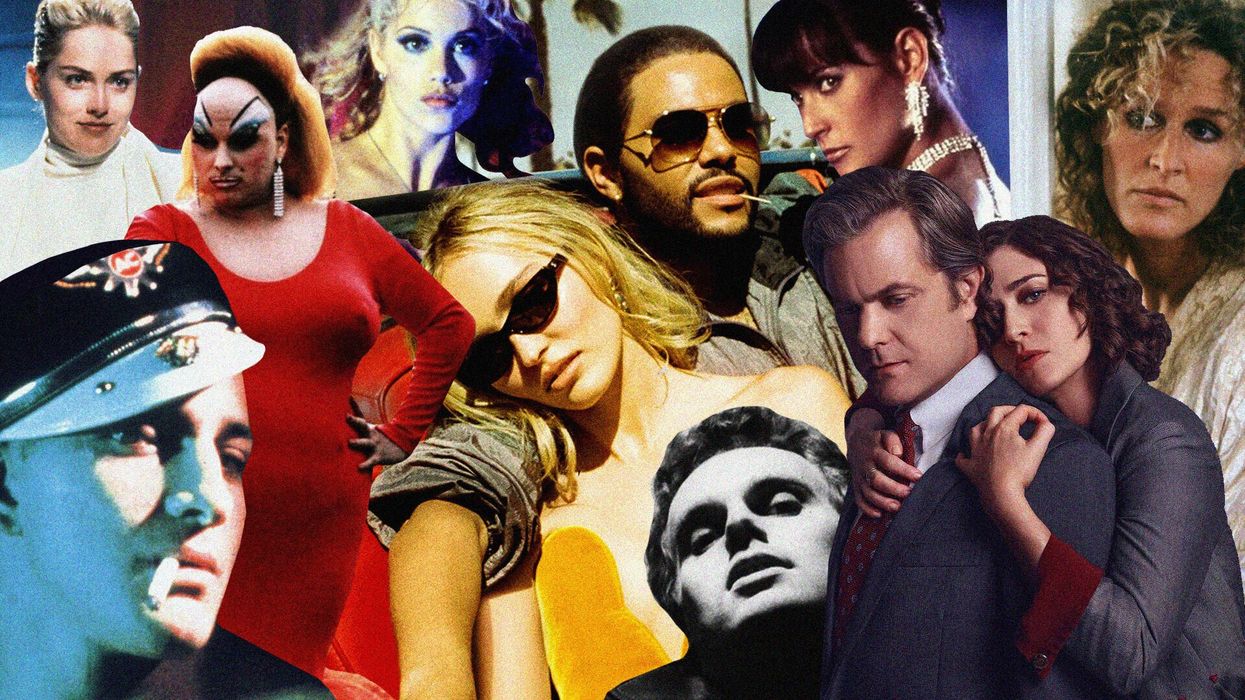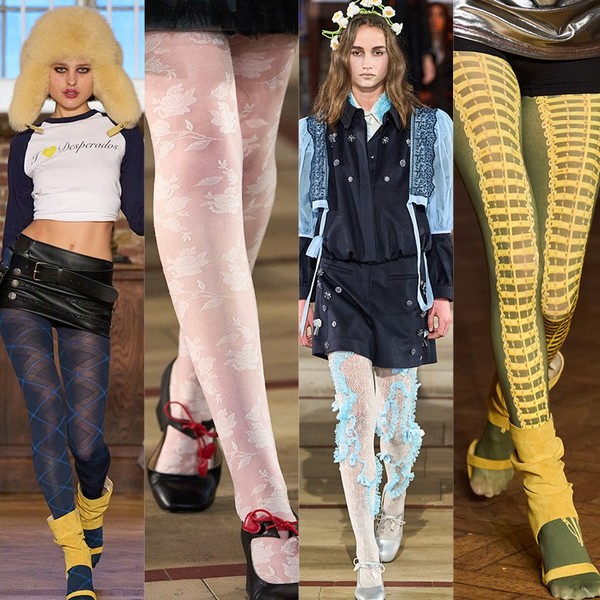Smut Was Never Meant to Be Prestige
From The Idol to the Fatal Attraction reboot, does high-brow smut have a place in the 2023 media landscape?

Two women in heavy stage make-up dine together at the Bellagio. They clink two glasses of champagne, inexplicably poured to the brim, as they bond over their shared fondness of eating dog food and having nice tits. The brunette, with a noticeably forced southern drawl, says, “You have nice tits. They’re really beautiful. I like nice tits, I always have. How ‘bout you?” The blonde answers, “I like having nice tits.” I’m sitting in the audience of a midnight screening where everyone around me is reciting the unhinged script in unison. The outrageousness is precisely what provokes our fondness for the 1995 Paul Verhoeven smutty cult film Showgirls. Fast forward to the recent past, where I’m viewing episode two of The Idol with these same friends. Onscreen, The Weeknd is watching a blindfolded Lily-Rose Depp writhe around blindfolded while he says, “Imagine my tongue on your pussy. My fat tongue.” Ew. Dog food and tits? Inspired. But The Weeknd’s fat tongue? Why am I suddenly clutching my pearls? While Verhoeven and Sam Levinson are playing with similar plotlines and boldly sexual themes, what makes Verhoeven’s work a delightful, campy romp, and Levinson’s The Idol so deeply charmless?
It didn’t take the heavy-handed inclusion of Basic Instinct in the pilot of The Idol to piece together Sam Levinson’s Verhoeven-heavy mood board for the sexy smash-flop series starring Abel Tesfaye. I’m not a Euphoria girlie or a horned-up teenage edgelord, but I am a longtime fan of Paul Verhoeven (also the director of Basic Instinct) and thus felt personally targeted as an audience for The Idol. As a card-carrying feminist and queer woman, I, too, am surprised my interests have such pronounced overlap with those of basement-dwelling, pervy Letterboxd geeks. I’m a fan of psychosexual thrillers; I worked at Playboy for over three years; and I studied arthouse film in college, including directors like John Waters and Andy Warhol. Combined, I am now basically an armchair expert in high-brow smut, which is, as far as I can tell, what Levinson was attempting to create with The Idol.
To be clear, there were a lot of reasons The Idol didn’t work. It’s exploitative, badly written, and structurally incomprehensible, but I don’t need to reiterate these points on top of the thousands of think pieces that are already out there. Given my predictable penchant for 1980s psychosexual thrillers, I realized I was also the target audience for Paramount+’s Fatal Attraction reboot. In contrast with The Idol’s controversial obscenity, Fatal Attraction (2023) was a soft-boiled disappointment nobody bothered to talk about. These contrasting but unequivocal flops have left me wondering: does smut have a place in the current media landscape of prestige television?
Not unlike the famed “I know it when I see it” definition of pornography, “smut” is a very particular brand of obscenity that is more easily recognized than described. Smut marks the difference between a movie that cuts to the next morning and a movie that shows everything. Smut is lesbian nuns, Tom of Finland lifeguards cruising at the beach, peep shows, Las Vegas, tawdry affairs in motels—all reveling in their own subversion. Smut is camp, outrageous and unflinching. Its confidence in itself makes it all the more profane. In the words of Divine’s Babs Johnson in Pink Flamingos, “Condone first-degree murder! Advocate cannibalism! Eat shit! Filth is my politics! Filth is my life!” How, then, is modern-day smut failing to meet smut’s high—or should I say impressively low—standards?
I have no plans to defend The Idol; for the record, I find Sam Levinson to be blustery and irritating at best, brazenly exploitative at worst. He wears his references on his sleeve in a way that he thinks are cheeky allusions, but to any film nerd worth their salt, are poorly executed xeroxes. He references greater art to give his films some kind of artistic credibility, but often the misogynistic claptrap feels more like mansplaining than homage. Assassination Nation was one of the few movies I almost walked out of. Malcolm and Marie was just a bastardized version of Who’s Afraid of Virginia Woolf? He has only ridden as far as he has on the caché of Euphoria, the success of which is less due to his soapy writing and more to the incredible performances of the actors (many of whom have fought back on Levinson for scenes they feel are unnecessary and exploitative). So if I’m also a diehard fan of so many of the same films Sam Levinson is constantly trying to reinvent, why does he consistently fail to hit the mark? The truth is, he’s completely missed what was so good about those films to begin with.
During the last century, the Hayes code and strict rules about sexuality on screen relegated obscenity to fringe and underground communities. Queer filmmakers and pornographers alike were forced to work on the sidelines. In the 1970s we saw filmmakers like John Waters, Andy Warhol, Kenneth Anger, and many more create low-budget, smutty cult classics like Pink Flamingos or Warhol’s controversial Blow Job, both of which had deep roots in the queer community. These films were genuinely subversive, coming out of communities that were pushing the boundaries of cinema. They were never mainstream, and were either relegated to midnight cult classics alongside Rocky Horror or grandfathered into the white cube art world. By the late 80s and early 90s, sex on screen was being churned out in big-budget studio films like Fatal Attraction, Basic Instinct, and Showgirls while indie directors like Harmony Korine, Larry Clark, and Todd Solondz were making a name for themselves with highly controversial movies that dealt with problematic themes of teenage sex, assault, obscenity, and queerness. Both high and low, smut had ultimately earned its place in the cinematic canon.
While Fatal Attraction and Basic Instinct are classic box office hits now considered problematic faves, Showgirls presents a more interesting case study. Off the heels of Basic Instinct’s success, director Paul Verhoeven went on to make this trainwreck of a film and masterpiece of overacting about a stripper who dreams of becoming a top-tier showgirl in Vegas. With its ludicrously unhinged sex scenes and over-the-top performances, Showgirls was obviously a commercial failure. It was panned and ridiculed to the point that it nearly ruined most of the actors’ careers. Demi Moore’s similar 1996 film Striptease met a similar fate. Showgirls, along with the big studio raunchy films, largely disappeared. However, in recent years, Showgirls’ widespread backlash has somehow led it to becoming a cult classic on home video. It had a renaissance as a midnight movie and has actually been praised by A-list directors like Quentin Tarantino and Jim Jarmusch. Why? Some attribute it to the “so bad it’s good” phenomenon, but I would argue it’s because its rocky attempt to critique the American dream paired with its unparalleled camp dialogue gave this film a unique cultural salience—attributes that take the focus away from its failed attempt to be a mainstream blockbuster. In short, it returned to where it belonged: to the fringe, and thus to the art freaks, queers, and freaky-deakies who gave smut a home in the first place.
Smut was never meant to be mainstream. It thrives within genres of comedy, camp, and kitsch. A Playboy centerfold of a nude woman spread-eagled on a bale of hay—that’s camp, honey. It falls apart the second it takes itself too seriously. Fatal Attraction is a highly problematic film, but through the lens of a camp-horror flick (instead of a misogynistic and deeply insulting depiction of mental illness), it endures. The 2023 remake attempted to amend its problematic elements with some half-baked episodes through “the woman’s POV,” but instead, the story simply lost its footing, and what they thought was a high-wire act felt more like a slackline. In an attempt to amend the problematic elements, the cautiousness neutralized the camp in a way that forfeited its crackle. In 2023 we certainly should be exterminating the problematic themes of 80s films—so maybe instead of all these milquetoast reboots, we should just be writing something new anyway.
The Idol was certainly a bungled attempt to write something new, but in contrast with the Fatal Attraction reboot, it seemed to only photocopy the problematic themes with none of the self-awareness or storytelling that made those films even remotely redeemable in the first place. I bet Sam Levinson smugly believes it will have the same renaissance as Showgirls, but that seems unlikely. Showgirls was a big swing and a big miss in a way that is a jaw-dropping spectacle—the dialogue is wildly quotable, the sex scenes laughably over the top, and the costuming and makeup totally inspired. Sure, the gays are having a pretty good time with the “I’m Just A Freak (Yeah)” song, but the show provides neither the dialogue nor narrative that would make it worth a second visit. Films like Showgirls and Basic Instinct benefit from the luxury of time. The problematic elements are easier to stomach knowing we’ve moved further away from that brand of misogyny and exploitation—it’s no excuse, but merely a lens. The Idol, on the other hand, can’t explain away its problematic elements. In short, we know better now. And unfortunately, The Idol has none of the charm, intellect, or narrative to carry its own weight in the shadow of its references. Levinson attempted to bring back the kind of smut we haven’t seen in decades, but is that even possible? Another pervy, straight, white dude is certainly not adding a fresh perspective to the genre. Smut at its finest relies on camp, comedy, and an irreverent point of view. In a landscape of self-serious prestige television, shows like The Idol and Fatal Attraction were simply designed to fail.



